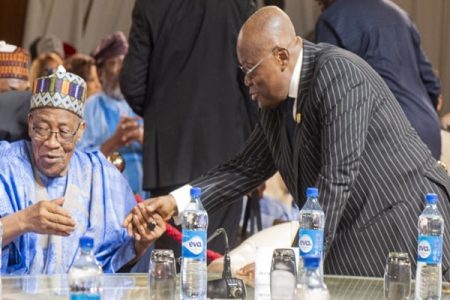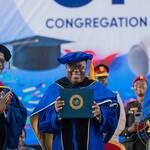Former President Nana Addo Dankwa Akufo-Addo has issued a stirring challenge to African nations, urging them to forge stronger bonds of cooperation and self-reliance instead of counting on international aid.
Speaking at the launch of former Nigerian President General Ibrahim Babangida’s long-awaited autobiography in Nigeria, Akufo-Addo emphatically stated that “there is no such thing as charity in international relations.”
His remarks, delivered in a climate of renewed geopolitical turbulence, call on African countries to take responsibility for their own development by investing in their capacities and resources.
Former President Akufo-Addo contended that, while African leaders have long been aware of the harsh realities of international aid, too many countries continue to be lulled into complacency, assuming that external assistance would always be available in times of crisis.
“Nobody is going to give you some vaccine until their own needs have been fully satisfied,” he declared, citing the global scramble during the Covid-19 crisis as a stark reminder of the limitations of depending on foreign benefactors.
In his view, the crisis compelled countries like Senegal, Nigeria, South Africa, Rwanda, and Ghana to take the bold step of manufacturing their own vaccines—a move that not only safeguarded public health but also asserted their economic independence.
The urgency for change
Reflecting on the Covid-19 pandemic, Akufo-Addo highlighted the immediate and long-term lessons learned from the crisis.
The experience, he noted, exposed the vulnerability of nations that rely on external aid, particularly in critical areas such as vaccine production and public health interventions.
He explained that the pandemic forced several African countries to confront an uncomfortable truth: reliance on international charity can be a double-edged sword, leaving nations at the mercy of global market dynamics and donor priorities.
This harsh lesson has catalyzed a new era of economic transformation across the continent.
His call for self-reliance is particularly resonant in today’s turbulent geopolitical landscape, where external support is increasingly uncertain and often contingent on the donor’s own interests.
Former President Akufo-Addo pointed out that the democracies of Africa, operating under the principles of universal adult suffrage, face unique challenges in orchestrating structural economic reforms.
The process of transforming an economy—especially one grappling with deep-seated social, political, and moral issues—requires difficult decisions that are often met with resistance from those who fear change.
“This generation is required to find the tools that will enable Africa to resolve these incoherences and tensions,” he stated, emphasizing the urgency for innovative solutions that prioritize freedom and self-determination.
Engineering a nation
During his address, Akufo-Addo recalled how young Colonel Babangida courageously approached coup-maker Lt-Col Dimka at Radio House in Ikoyi to dissuade him from a doomed venture.
In a candid critique of military regimes, he observed that while some still defend the merits of military government, the true cost of such regimes is far higher in terms of resources spent on security and the perpetual threat of instability.
“A military government, indeed, spends even more energy and resources on security considerations than an elected, democratic one,” he noted.
Former President Akufo-Addo said Africa needs the kind of accumulation of capital, which spurred the industrial revolutions in the West and East, occurred long before those nations achieved universal adult suffrage.
In contrast, African democracies are now attempting to transform their economies amid challenges that are both predictable—like lifting people out of poverty and maintaining affordable food prices—and unpredictable, such as security threats that force governments to divert vital resources.
Reflecting on this, he acknowledged that “if it is a difficult and exhausting process to come up with a plausible and workable foreign policy for an African country today, it was a bigger nightmare at the time described in A Journey In Service.”
Bridging history and the future
The launch of General Ibrahim Babangida’s autobiography provided a timely backdrop for Akufo-Addo’s discourse.
He saluted past Nigerian leaders for their roles in securing stability and democratic development in Nigeria—a nation he described as an exemplar of development in freedom.
He lauded Geneal Babangida for offering a fascinating, first-hand account of a critical period in Nigerian history, one that serves as both history and folklore for younger generations.
Former President Akufo-Addo remarked on the striking similarities between the challenges faced by Nigerian and Ghanaian leaders across different eras.
“There should not be many differences between the Nigeria of 1985 to 1992, and the Ghana of 2017 to 2025,” he mused, reflecting on how, despite decades of change, the fundamental challenges remain similar.
He recalled his own experiences living through years of coup d’états and military rule in West Africa, acknowledging that such turbulent times left an indelible mark on the collective psyche of the continent.
In a lengthy and candid reflection, he quoted General Babangida’s assertion that “there exists a world of difference between engineering a nation and ruling it. I never wished to rule Nigeria, and I never did it. My goal was to engineer it.”
Akufo-Addo explained that this philosophy underscores the importance of charting a new course for a nation—one that harnesses human, material, and moral resources while redirecting and refocusing the nation’s collective psychology toward a future that can be understood, mastered, and managed.
“Engineering a nation is, in reality, inventing the future,” he declared, urging African leaders to adopt a similar visionary approach.
Democratic transformation
Emphasizing the need for greater individual freedom within the framework of democratic governance, Akufo-Addo made a passionate plea for public policy that enlarges liberty.
Drawing on the philosophies of Thomas Jefferson and J.B. Danquah, he insisted that the ultimate goal of governance should be to expand the freedom of the individual, ensuring that the rule of law is not only maintained but also used as a tool for societal transformation.
Akufo-Addo’s remarks carry a powerful message for the continent: that relying on international aid is not a sustainable solution.
Instead, African nations must invest in themselves, build robust economic structures, and foster regional cooperation.
Confronting the return of military Coup d’états
In his closing remarks, Akufo-Addo expressed deep concern over the resurgence of military coup d’états in the region—a development he sees as a step backward for African democracies.
He lamented that in times of economic hardship or unpopular government policies, some view military intervention as a viable solution.
“I feel a deep sense of disappointment that military coup d’états have come back in fashion in our region,” he stated, warning that such actions only serve to undermine the democratic structures that have been painstakingly built over decades.
Akufo-Addo’s words are a clarion call to all African nations to consolidate democratic institutions, foster transparency, and empower citizens through genuine freedom and participation.
He warned that without these fundamental changes, the path to sustainable prosperity would remain fraught with instability and insecurity.
A Vision for Africa’s future
As former President Akufo-Addo concludes his address, his challenge to African nations is both urgent and inspiring.
He called for a collective reimagining of the future—one in which African countries harness their own resources, engage in meaningful cooperation, and build systems that prioritize freedom, innovation, and sustainable growth.
“We must find the tools to resolve our incoherences and tensions,” he urged, leaving his audience with a powerful message: the future of Africa depends on the choices made today.
With visionary leaders like Akufo-Addo calling for self-reliance and transformation, the continent is presented with an opportunity to redefine its destiny.

